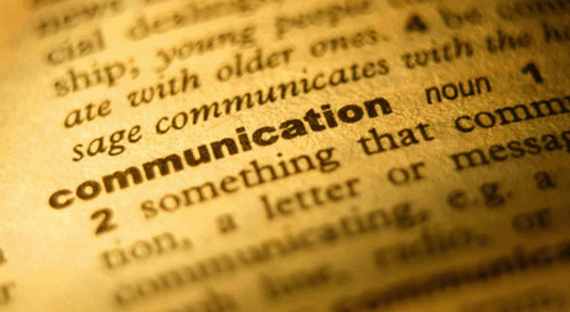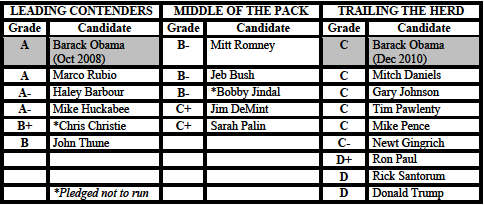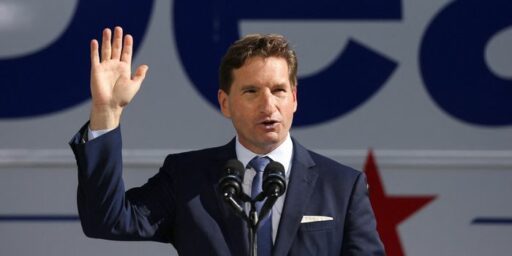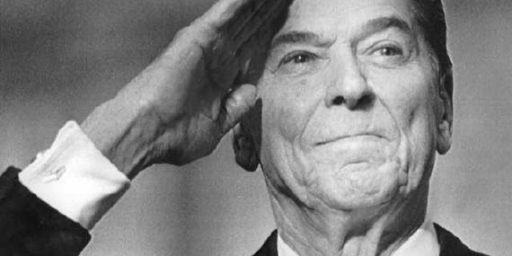Ranking the 2012 Contenders: Communications Skills
Are Marco Rubio, Haley Barbour, and Mike Huckabee the favorites to win the White House?
Brad Phillips, who has apparently dubbed himself “Mr. Media Training,” ranks the 18 Republican contenders and President Obama on the basis of communications skills. Writing in the third person, he tells us,
“Most pundits analyze a general election by looking at the same old measurements, such as unemployment data, consumer confidence, and early polling,” said Brad Phillips, author of the analysis and a former journalist with ABC News and CNN. “But they always miss a reliable predictor: the more gifted media spokesperson has won every presidential election since the beginning of the 24/7 media age in 1980.”
This is not falsifiable without a priori rankings of “giftedness” for every candidate during these races, which only Mr. Media Training could provide since he’s making this up as he goes along. But using my own sense of communications skills, I’d say this is nonsense.
Obvious cases of the principle at work: Ronald Reagan, Bill Clinton, and Barack Obama. That’s five of the eight elections during the time period in question, so pretty impressive. But quite possibly coincidental — factors other than communications giftedness doubtless mattered.
But, surely, George H.W. Bush, with his mangled syntax, wasn’t the most gifted candidate in the 1988 field? For one thing, Jesse Jackson was a candidate that year. So was Pat Robertson. They’re both professional con men of the highest caliber. But I’d argue that Al Gore, Gary Hart, Joe Biden, Don Rumsfeld, nd Jack Kemp were all better talkers than Bush. And several of the also-rans were surely as good.
And, goodness gracious, George W. Bush won the presidency twice. I’d argue that Al Gore and, certainly, John Kerry were better communicators. Surely, Bill Bradley was. Pat Buchanan is an enormously skilled communicator. Alan Keyes, too, if you don’t mind a little crazy mixed in. And Liddy Dole, Steve Forbes, and John Kasich are all very good speakers. And, hell, Harold Stassen was a professional presidential candidate!
Actually, though, Phillips has a more plausible — if even less falsifiable — set of assertions:
The candidates were evaluated on the following seven criteria, which have held true for every general election since the beginning of the 24/7 media age in 1980:
1. The candidate with the clearest message has always won
2. The candidate who articulated the clearer vision has always won
3. The sunnier candidate with the more optimistic message has always won
4. The candidate whose message is best aligned with constituent concerns has always won
5. The more charismatic candidate has always won
6. The candidate who appeared most comfortable in his skin has always won
7. The candidate who uses the most plain-spoken language has almost always won
I’d say that 1 is largely meaningless and that 4 is tautological. But, otherwise, the assertions are more useful than merely “communication skill.”
At any rate, here are Mr. Media Training’s rankings of the candidates for 2012:
You’ll note that, while October 2008 Barack Obama leads the list, December 2010 Barack Obama is “trailing the herd.” Apparently, Phillips informs us in a separate piece, “he’s failed to recover his communications mojo ever since the health care debate spawned vituperative town hall meetings in August 2009.”
I agree that Obama’s “mojo” isn’t what it used to be. But I’d nonetheless put his odds of being president come January 2013 well ahead of those of, say, Jim DeMint or John Thune.
via Taegan Goddard
UPDATE: Phillips writes to note, correctly, that his “analysis clearly stated that the measurements apply solely to general elections, not primary elections.” He guesses “communications measurements appear to influence independent voters more than hardened partisans.”
Fair enough. But looking only at general election contests means we”re down to eight contests, five of which were won by Reagan, Clinton, and Obama. And I’d still argue that Gore and Kerry were better communicators than Dubya, even though I voted for him twice.
(Of course, you can argue 2000 either way: Gore got more votes. That doesn’t matter in terms of election outcomes, as we don’t decide presidential races that way, but it may in terms of judging a theory about how people vote.)








Dear Dr. Joyner:
You won’t be shocked to learn that I disagree with much of what you wrote about my analysis, but I recognize your right to disagree and won’t try to change your mind.
There is one objective fact I wanted to correct, though: The analysis clearly stated that the measurements apply solely to general elections, not primary elections. You’re right that these metrics don’t hold up in primary elections, largely because these communications measurements appear to influence independent voters more than hardened partisans. Many of the candidates you mentioned – Liddy Dole, Jesse Jackson, Joe Biden, Gary Hart – never made it to the general, and were in no way part of this analysis. It’s true that Mike Huckabee was a better communicator than John McCain in the 2008 primary, for example, but that fact has nothing to do with this analysis of general elections.
Anyway, thank you for looking at the analysis, and hopefully the power of my argument will win you over on the next story.
– Brad Phillips
There is also the minor problem that N=8 in terms of general elections inclusive of 1980 (the degree to which that was an election profoundly influence by the then new-fangled 24/7 news cycle is debatable).
I also concur that the operationalization of most (if not all) of the variables is almost impossible.